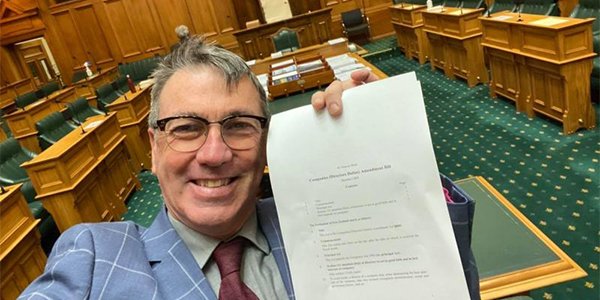Governance news bites – 30 May
A collection of governance-related news that you might have missed in the past two weeks.

The roles and responsibilies of directors are greater now than at any time in the past. Boards increasingly need to come to grips with a multitude of social, cultural and economic issues, while also addressing how to grow their businesses in a sustainable way.
“There is a real role to make sure that those who for whatever reason haven’t managed to flourish, for us to make people’s lives as good as they can be,” says Professor Duncan Webb, Labour MP for Christchurch Central.
A former lawyer, Webb’s name is on a new bill drawn from the member’s ballot box last month which will see the traditional model of directors duties shift.
In a recent interview with Steven Moe, Partner at Parry Field Lawyers in Christchurch, Webb sees the traditional governance model as outdated and says historically, directors' duties have followed a narrow line of discussion, which needs to expand beyond a limited scope that focuses only on maximising profits.
“The limited liability company was essentially coming together in its early stages with a group of people with a common purpose,” he says.
“And for a neo-conservative approach to say that the purpose must be to make as much money as you can, just makes no sense.”
The Companies (Directors Duties) Amendment Bill will address the wider implications of decisions made by directors - their priorities, and the much larger flow-on effects.
Because focusing on a model of creating wealth for those at the top doesn’t take into consideration the well-being of employees, environmental impacts and a raft of other social issues.

Dr Webb says while he hasn’t come from a long lineage of social enterprise and B-corps, proposing the new bill was common sense.
Born in Woolwich in the UK, Webb’s parents came to New Zealand in the 1970s.
Like many migrants, his parents were seeking new opportunities and a change of lifestyle. They joined the evangelical church before coming to New Zealand. On their arrival, his father, a former junior accountant, became a pastor of a Māori evangelical fellowship church.
Webb grew up in Aranui and South Brighton and says the wide open landscape was very different compared to life back in the UK where they were surrounded by concrete.
An alumni of the University of Canterbury, Webb pursued law, partly informed by his parent’s pastoral background.
“I knew what not having lots of money looked like and I thought a profession, which made life a little more comfortable, couldn’t be a bad thing.”
Although comfort wasn’t the only factor. He was also intent on maintaining a community focus.
During his law career Webb was involved in the Howard League, an organisation that looks to reduce recidivism rates, promoting prisoners’ rights and assisting them with reintegration into the community.
But remaining within the legal profession wasn’t to be a life-long career.
When Webb made his transition away from law he was a partner at commercial firm Lane Neave and says shifting to politics came at the right time. His children were older, and he saw politics as a space to make a difference on a local, and national level.
“One of the important things in our democracy is how close people are to the decisions that are being made,” he says.
Webb is open about making time for real conversations on issues that affect people in the community.

“As a backbencher, one of my jobs is to be right on the ground listening to these people and making sure that if it isn’t an outlier case, that that’s known right at the highest level.”
Webb often receives letters from people addressing their concerns, and it isn’t uncommon for him to meet face-to-face to understand what is going on.
But while he refers to the Directors' Duties Amendment Bill, as ‘this little bill’ he is aware of the impact it is likely to make. Directors will no longer feel beholden or constrained by an historic model of governance that does not fit the time we live in.
One of the areas Webb insists needs to be included in the bill is a connection to the Treaty of Waitangi. He cites the importance of work around Māori enterprise and more discussion needed that addresses the current companies act, which ‘is not a good reflection of Te Ao Māori - the Māori way or Māori worldview.’
He says his bill offers the values and general precepts that directors can look to.

Image credit: Notes on Maori language and aspects of Maori life Vol 5. Stowell, Henry Matthew 1859-1944: Notes on Maori language and aspects of Maori life. Ref: MS-2071. Alexander Turnbull Library, Wellington, New Zealand.
“So there is no direct, linear, solid line to the Treaty of Waitangi. It's a dotted line saying, ‘every good New Zealand citizen, corporate or otherwise, lives within an environment where the Treaty is important.' And it is absolutely legitimate for a limited liability company to say, ‘how do our actions tie up with the wider obligations to Māori?'”
There will be two areas up for debate on the bill:
"In my view, it’s always been the law that if the directors and shareholders are essentially at-one, that if the company has a particular mission, which might be to build more houses for low income people - and if that’s not the most profit-maximising sector of the market - that’s entirely okay,” he says.
He adds that the law has set the moral boundaries and has stated what we mustn't do. And on occasion, it says what we must.
“Obviously there are solvency requirements. I know enough about company law to know how that works. But at the end of the day, to say we want to run a company which builds environmentally sustainable houses for our most needy, including Māori, you might call that a social enterprise.”
He says there might not be a need to have a ‘special vehicle’ for this, but it needs to be acknowledged that the current vehicle - the limited liability company - is a morally neutral one.
“It’s absolutely appropriate for its directors and owners to use it as a vehicle for their own mission. And if it's a great mission with real value and ethics, then that’s even better.”
Quotes extracted from a recent podcast episode of Seeds hosted by Steven Moe.